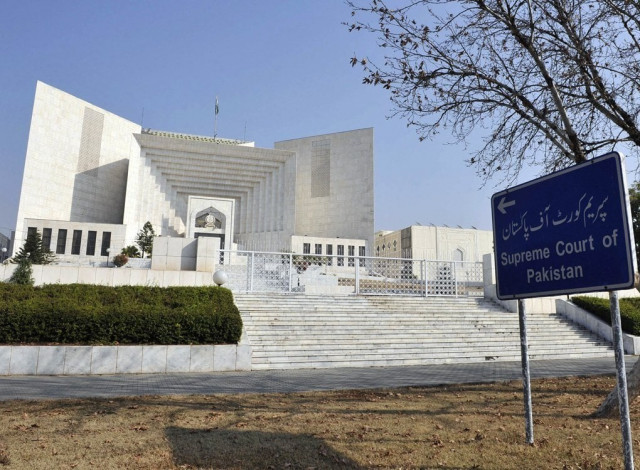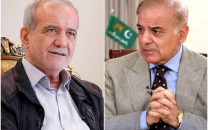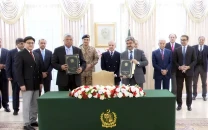Court to decide if Reko Diq reference maintainable
SC seeks opinion and issues notices on presidential reference about project’s deal

The Supreme Court asked the relevant parties on Tuesday to present their opinion regarding maintainability of a presidential reference about the Reko Diq agreement.
The court issued notices to the Balochistan government, Oil and Gas Development Company Limited (OGDCL), Pakistan Petroleum Limited (PPL), Barrick Gold Corporation, and the Pakistan Bar Council (PBC).
A five-judge bench, headed by Chief Justice Umar Ata Bandial, took up the presidential reference. At the outset of the hearing, Additional Attorney General (AAG) Aamir Rehman presented details of the matters related to Reko Diq mines.
The court was informed that the Balochistan Government signed the Chagai Hill Joint Venture Agreement in 1993. Later in 2000, the Tethyan Copper Company invested $240 million.
However, in 2006, a constitutional petition was filed in the Balochistan High Court (BHC) against the gold mining agreement. The BHC dismissed the petition but in 2013 the Supreme Court declared the joint venture illegal.
On that, the apex court was further informed, the Tethyan Copper Company approached the international courts, which imposed a fine of more than $9 billion on Pakistan.
Now, under the proposed agreement, the AAG told the bench, the government of Pakistan would get 25% shares and the Barrick Gold Company would get 50% shares.
Sitting on the bench, Justice Jamal Khan Mandokhel enquired about the share of the Balochistan government. He also raised the question as to who actually owned the Reko Diq mines, and why the Barrick Gold was getting 50% shares.
The AAG replied that Balochistan’s share would be 25%, to be paid by the federal government. He added that Reko Diq deal would general $104 billion profit, out of which the Centre and Balochistan would get 62% after including all the levies.
AAG Aamir Rehman said that the Tethyan Copper Company needed solid assurances for such a large investment, adding that if the court did not allow the deal, Pakistan would have to pay $9 billion.
Justice Ijazul Ahsan said that from where will the government pay $9 billion? The AAG replied that if $9 billion have to be paid, there would be no foreign investment in Pakistan.
Justice Ahsan asked about the role of the court in the international agreements of the government. He added that the government had adopted a unique procedure, seeking prior opinion of the court before enacting the legislation.
The chief justice said that the government could take assistance from legal experts on the Supreme Court decisions. He also asked the AAG whether the court could give opinion on financial matters.
Should the court protect foreign investors, Chief Justice Bandial posed a question, stressing that it was for the government to decide how to protect foreign investors. He also pointed out that there were international arbitration rules.
The AAG said that there was a condition in the investor’s agreement that assurances should be taken from the court. In that case, Justice Mandokhel said, if someone was affected by the Reko Diq agreement in future, he would not be able to come to court.
The chief justice said that usually interpretation of the constitutional provision was sought in the presidential reference but in the present reference, opinion was being sought on a 9-year-old judgment on a 1,500 pages of contract.
The chief justice asked the AAG whether it was a presidential reference for revising the Supreme Court’s decision in 2013. He further said that payment under a treaty was a political question which could be looked into by the Council of Common Interests (CCI).
The chief justice told the AAG that court decisions, which become final, could not be reviewed. Therefore, he added, the court would not set a new precedent of reconsidering old decisions in the presidential references.
Also sitting on the bench, Justice Muneeb Akhtar asked why the federal government was making the financial payments for the agreement instead of the Balochistan government.
Justice Mandokhel remarked that the old deal on Reko Diq was made irresponsibly but the government had shown a lot of responsibility in the new Reko Diq deal.
The chief justice said that if Pakistan had the resources, the Reko Diq Agreement would have been settled on some other terms. However, he remarked that it was not the court’s job to give an opinion on these matters.
The court was not an expert on financial matters, the chief justice remarked. He pointed out that the questions asked in the reference were very broad and urged the government should narrow them down.
The chief justice said that Pakistan had until December 15 under the agreement, therefore, the court’s feedback would have to be given before that. He asked the AAG to suggest people to assist the court.
The hearing was adjourned until Tuesday



















COMMENTS
Comments are moderated and generally will be posted if they are on-topic and not abusive.
For more information, please see our Comments FAQ